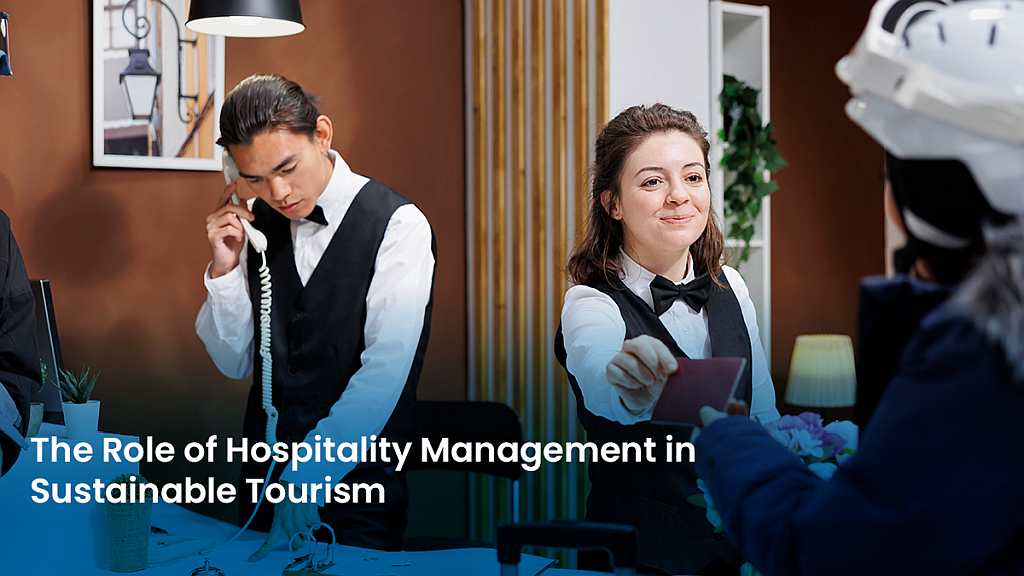- Hospitality management has transformed post-pandemic, focusing more on health and safety protocols.
- Contactless technology, such as mobile check-ins and AI-driven service, has become a cornerstone of guest experiences.
- Sustainability is now a core focus, with eco-friendly practices driving customer loyalty and business success.
- A hospitality course equips aspiring professionals with updated knowledge and skills for this evolving industry.
- Eton College’s Flight Attendant Preparation Program (FAPP) provides transferable skills that are valuable in both aviation and hospitality management.
Like many others, the hospitality industry faced unprecedented challenges during the pandemic. As the world recovers, hospitality management is evolving to meet new demands, reshaping how businesses operate and adapting to changing guest expectations. The post-pandemic era has transformed significantly from innovative technology to heightened health protocols.
Understanding these changes is crucial for aspiring professionals, and enrolling in a hospitality course can provide the tools and insights needed to thrive in this dynamic industry.
The Impact of the Pandemic on Hospitality Management
The pandemic disrupted the global hospitality industry, forcing businesses to rethink operations and customer engagement. Hotels, restaurants, and event spaces had to adapt quickly to changing safety regulations, limited capacities, and fluctuating travel demand.
While these challenges were immense, they paved the way for innovation and resilience. Hospitality management now emphasizes flexibility, digitalization, and personalized guest experiences more than ever.
Key Changes in Hospitality Management Post-Pandemic
Emphasis on Health and Safety Protocols
Health and safety are now at the forefront of hospitality operations. Guests expect rigorous cleaning protocols, contactless check-ins, and safe dining options. Hospitality managers are tasked with maintaining these standards while ensuring a welcoming atmosphere.
Rise of Contactless Technology
Technology has become a cornerstone of modern hospitality management. Digital tools like mobile check-ins, keyless entry, and AI-driven customer service are reshaping the guest experience. These innovations not only enhance convenience but also prioritize safety and efficiency.
Shift Toward Sustainability
The pandemic accelerated the focus on sustainability in hospitality. Eco-friendly practices, such as energy-efficient operations and waste reduction, are now integral to management strategies. Guests increasingly favor businesses that align with their values, making sustainability a competitive advantage.
Growth of Domestic Tourism
International travel restrictions during the pandemic led to a surge in domestic tourism. Hospitality management is now tailored to attract and retain local travelers, offering personalized packages and regional experiences.
Greater Flexibility in Bookings
Flexible cancellation and rebooking policies have become essential for gaining guest trust. Hospitality managers must balance flexibility with revenue optimization to ensure customer satisfaction and business sustainability.
Why a Hospitality Course is Crucial in This Era
As hospitality management evolves, so do the skills required to succeed in this industry. A hospitality course equips aspiring professionals with essential knowledge and practical experience to navigate these changes. Key benefits include:
- Learning Modern Management Practices: Courses cover updated protocols, from health standards to digital tools.
- Developing Leadership Skills: Effective communication and team management are vital for adapting to new challenges.
- Understanding Sustainability Trends: Hospitality courses teach strategies to implement eco-friendly initiatives.
- Hands-On Training: Many programs, like Eton College’s hospitality-focused courses, offer real-world experiences to prepare students for industry demands.
Emerging Trends in Hospitality Management
Personalization Through Data
Using guest data to create personalized experiences is becoming a priority. From room preferences to dining habits, hospitality managers use analytics to tailor services and exceed expectations.
Integration of AI and Automation
Automation is streamlining operations, from chatbots for customer inquiries to robotic assistants in housekeeping. Hospitality managers are now required to balance automation with a human touch.
Hybrid Events
The rise of hybrid events, blending in-person and virtual elements, has transformed event management. Managers must adapt to new technologies and seamlessly cater to both audiences.
Focus on Employee Well-Being
The pandemic highlighted the importance of employee well-being. Hospitality managers implement initiatives like mental health support, flexible schedules, and skills training to retain talent and improve workplace culture.
How Eton College Prepares You for Success in Hospitality Management
In the ever-evolving hospitality industry, having the right skills and training is essential for staying competitive and delivering exceptional guest experiences. Eton College stands out as a leading institution that prepares students for the dynamic world of hospitality and tourism, offering specialized programs like the Flight Attendant Preparation Program (FAPP).
Why Choose Eton College’s FAPP?
While the Flight Attendant Preparation Program primarily focuses on aviation, its training extends beyond the skies. It equips students with crucial customer service and hospitality management skills that can be applied to the broader tourism and hospitality sectors.
By combining theoretical knowledge with hands-on learning, Eton College’s FAPP prepares aspiring professionals for careers in hospitality management, aviation, and beyond.
Step Into the Evolving World of Hospitality Management
Hospitality management is about adaptability, innovation, and guest-centric operations in the post-pandemic era. The industry is reshaping itself from advanced technology to sustainable practices to meet modern demands and expectations.
Aspiring professionals can stay ahead by enrolling in a hospitality course that provides practical insights and prepares them for real-world challenges. Programs like those offered at Eton College ensure students have the skills to thrive in this dynamic and ever-evolving field.
Start your journey in hospitality management today and become part of an industry redefining the art of service!
FAQs
How has hospitality management changed post-pandemic?
It now emphasizes health protocols, digital innovation, sustainability, and flexibility in operations.
Why is a hospitality course important today?
A course equips you with the skills and knowledge to adapt to evolving industry demands and build a successful career.
What role does technology play in modern hospitality?
Technology enables contactless check-ins, AI-driven service, and efficient management systems, enhancing guest experiences and operational efficiency.
How has sustainability impacted hospitality management?
Sustainability is now a core focus, with businesses adopting eco-friendly practices to meet guest expectations and reduce environmental impact.
How can Eton College help me succeed in hospitality management?
Eton College offers comprehensive courses that combine theoretical knowledge with practical training, preparing students for success in the evolving hospitality industry.





